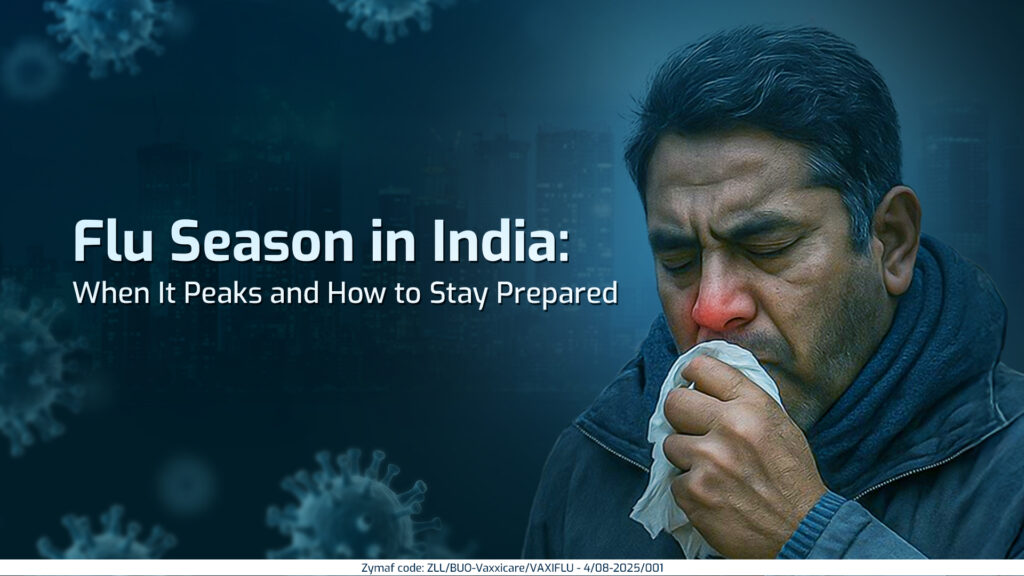Every year, when the weather and seasons change, the coming of flu season – a familiar pattern emerges throughout most of India. For many people, it is only a fleeting phase characterised by sniffles, coughs, and a few days in bed. Others, particularly the elderly, children, pregnant women and those with chronic health conditions, may be at greater risk from influenza (Flu). ¹ Understanding when the flu normally strikes, how it spreads, and how to prepare for it can help protect you and your loved ones.
What is Influenza (Flu) ? ²
Influenza (Flu), sometimes called the flu, is a contagious respiratory illness caused by influenza (Flu) viruses. It spreads mostly by droplets produced by infected individuals who are sneezing, coughing, or talking.
Symptoms ²: Typical flu symptoms include fever, cough, sore throat, body aches, exhaustion, and, in some cases, gastrointestinal problems such as vomiting or diarrhoea – particularly in youngsters. Influenza (Flu) One of the most common types causes symptoms similar to these, but it can progress quickly in vulnerable people.
What we can do ²: To lower the risk and severity of infection, Flu vaccines are created and updated on an annual basis. During a given season, these vaccinations are intended to provide protection against the most common strains of the influenza (Flu) virus.
The Challenge: Misunderstanding the Flu Vaccine ³
Understanding how the flu vaccine works and a widespread lack of knowledge about the same is one of the continuing issues in India.
-
- One of the most popular misconceptions for some people is that it can give them the flu.
-
- Other people question its significance in a tropical climate like ours.
-
- The truth is that flu vaccines contain inactivated viruses or fragments of viruses that do not cause illness but can help your immune system recognise and respond more effectively if you are exposed to the actual virus.
Furthermore, people don’t realise the difference in intensity and possible repercussions and frequently confuse the flu with a normal cold. This misperception has caused many people to underestimate the importance of preventive measures, including immunisation. Lifestyle behaviours and home treatments can help in some of the cases; they do not always provide adequate protection against more dangerous influenza (Flu) viruses.
What Happens When You Are Not Protected?
-
- Skipping flu prevention, especially during peak seasons, might raise the likelihood of being ill, missing school or work, and perhaps transmitting the illness to others. ⁴
-
- In India, the flu season typically peaks twice a year: first during the monsoon (June to September) and again in the winter (December to February).⁵
-
- Public transport, schools, and congested workplaces become hotspots for transmission during these months.
The flu can progress to complications that require more acute care if not treated promptly. ⁶ People with weakened immunity or underlying chronic conditions should not be concerned only with the flu itself, but also with the illnesses that it can cause or worsen. Unfortunately, by the time symptoms worsen, it’s typically too late to stop the spread.
In Conclusion
If you’re unsure how to protect yourself or whether you’re at higher risk, consult your doctor. They can advise you on the best methods to be prepared, particularly during India’s peak flu season. A little awareness can go a long way in both health and life.
You can prepare yourself against the Flu with India’s Flu Protection. Consult your doctor today about the Flu vaccine and ask yourself, “Flu Vaccine Liya Kya?”
References:
1: https://www.who.int/news-room/fact-sheets/detail/influenza-(seasonal)
2: https://www.who.int/news-room/fact-sheets/detail/influenza-(seasonal)
3: https://www.nfid.org/resource/myths-and-facts-about-influenza-flu/
4: https://pmc.ncbi.nlm.nih.gov/articles/PMC9748403/
5: https://pmc.ncbi.nlm.nih.gov/articles/PMC4193176/
6: https://my.clevelandclinic.org/health/diseases/4335-influenza-flu

